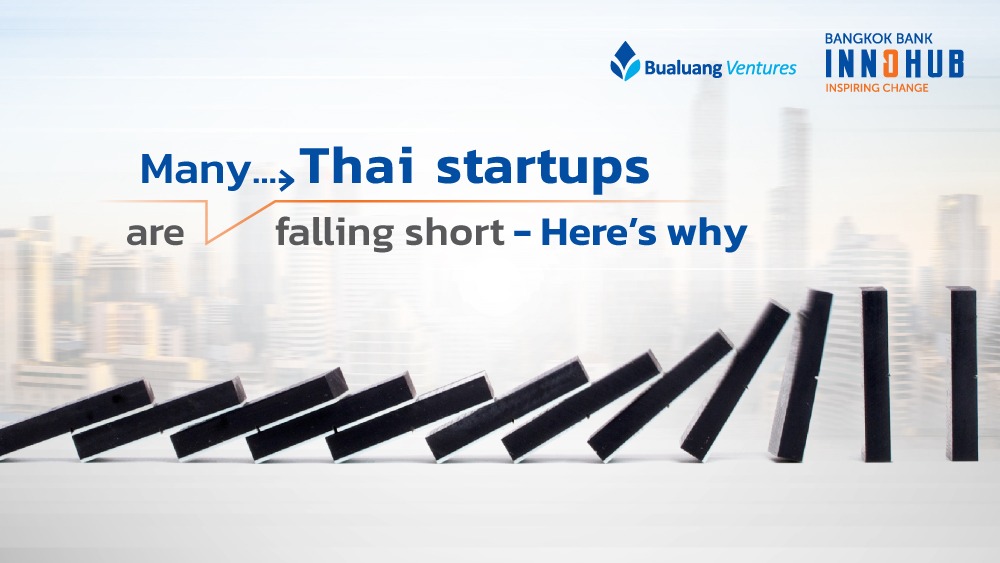Many Thai startups are falling short – here’s why
The statistics are discouraging: With tens of thousands of new startups launched every day around the world, a clear majority fail to progress past this stage and into the world of stable, established businesses.
Startups in Thailand face a particular set of obstacles, in addition to the common challenges that new businesses in other countries must also overcome. Some of these difficulties are the product of external variables, such as Thailand’s education system, which is chronically underfunded and often struggles to keep up with its neighbors, while others can be addressed directly by entrepreneurs.
Below we explore several of the key impediments that have slowed down progress for Thai startups in recent years. As we will see, some of them are public shortcomings, while others fall squarely on the startups themselves – but each should be on the minds of entrepreneurs as they chart a path forward for their startups.
External challenges:
Lack of R&D infrastructure – From universities to the business world itself, most research is intended for specific applications rather than to expand the limits of knowledge in all directions. This approach tends to yield incremental innovations, rather than the type of game-changing technologies that purely creative, sandbox-style research efforts often create. The result is that companies in other countries develop new technologies first, giving themselves a major head start that Thai startups then have trouble catching up to.
Lack of English proficiency – Even though Thai startups primarily target Thai audiences, an inability to communicate in English can have serious consequences. Part of the journey from a startup to an established company is about securing investors and establishing partnerships. Thai government agencies even encourage foreign investors to attend pitching sessions – but without sufficient English skills, young companies cannot begin to attract support for their ideas, costing them potential investors and business relationships.
Lack of experience – Because Thailand is relatively new on the world stage, its business community does not possess the amount of institutional knowledge that more advanced economies provide. Many Thai entrepreneurs therefore venture into startups without a deep understanding of the needs of the market, or how to fulfill them from a customer-centric perspective.
Launching a startup is already a daunting task, but addressing the above shortcomings may require new business owners to move even further out of their comfort zones. Taking a non-traditional approach to research, forcing oneself to learn English and speak it while standing in the spotlight, and seeking expert help on complex questions can go a long way towards overcoming these obstacles.
Internal challenges:
Lack of internal balance – Having the right people on the team is about more than just talent, work ethic, or even team spirit. Some startups in Thailand bring together too many people who all have similar knowledge and skills. Very often, this group is hired because their mindset is similar to the director’s – and therefore they get along well. But business success is about having a variety of different moving parts, all complementing one another. If a FinTech startup is full of members who know about coding, but no one on the team has any experience developing a long-term business model, or handling accounting tasks, they will not be able to survive in a competitive landscape.
Lack of market research – Some products are too difficult for new users to understand, while others are marketed toward the wrong audience. Businesses should identify pain points, test their products with potential customers, learn from failures, find a suitable niche where they can deliver better value than their competitors, and develop marketing campaigns that resonate. Customers likely already have their favorite brands; the challenge for startups is to identify creative ways to persuade people to try new solutions.
Lack of a financial mindset – Poor financial planning, and particularly a failure to secure additional funding, is a key reason why Thai startups often go bust. No matter how effective your product may be, bringing it to market can be expensive. From the very start, entrepreneurs should be thinking about how they can attract investors – and building the skills to make these connections a reality.
The recipe for success
To create something new, you will always need to carry out tasks that are unfamiliar. Though your instincts may guide you to ‘safer’ decisions, you must have the courage to take the harder path. Learn English. Practice presentations. Study the market. Hire people who know things that you don’t know. Let the creative process take you in new directions. Seek out peer criticism and customer feedback, using them to adjust your strategy where necessary. Blaze a new path forward.
Most of the time, you will have enough talent to succeed. With help from the right partners, you can also secure resources to keep your company going. Success comes when you learn to combine talent and resources in just the right way, lighting the spark and letting your team reach its full potential.
The task is hard, and the temptation to cut corners will always be there. But in this competition, there are no shortcuts to victory. You must always search for mistakes to correct, knowledge to absorb, and new opportunities to pursue. This continuing effort could very well make the difference between a startup that fails to get off the ground, and one that soars to the heavens.




